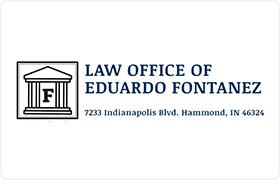Crown Point Felony Lawyer, Indiana
Sponsored Law Firm
-
 x
x

Click For More Info:
-
Law Office of Eduardo Fontanez
7233 Indianapolis Blvd Hammond, IN 46324» view mapCriminal Defense, Divorce & Family Law Former Judge & Former Deputy Prosecutor
I hope we can resolve any issue you may need. Here at the Law Office of Eduardo Fontanez, are focused on providing high-quality service and customer satisfaction.
800-697-7560
Not enough matches for Crown Point Felony lawyer.
Below are all Crown Point Criminal lawyers.
Paul Stracci
✓ VERIFIED *Status is reviewed annually. For latest information visit herePaul Stracci is a uniquely experienced criminal trial attorney who has had remarkable success in the courtroom. He successfully defended his first mu... (more)
Aaron L. Robbins
✓ VERIFIED *Status is reviewed annually. For latest information visit hereAt Robbins and Seville, LLC, we specialize in providing 21st-century solutions to our clients' legal challenges. This includes utilizing cutting-edge... (more)
Aaron A. Koonce
✓ VERIFIED *Status is reviewed annually. For latest information visit hereAttorney Aaron A. Koonce was born in Hammond, Indiana and has been a life-long resident of Lake County, Indiana. Aaron grew up in unincorporated Crown... (more)
T. Edward Page
Alison Louise Benjamin
Samuel George Vazanellis
Stephen Charles Bower
Beth Brown
Andrew M. Yoder
FREE CONSULTATION
CONTACT Eduardo Fontanez Hammond, IN
Eduardo Fontanez Hammond, IN Practice AreasExpertise
Practice AreasExpertise


